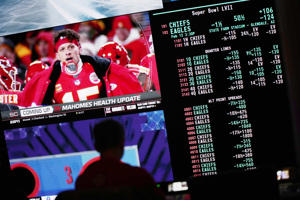© John Locher, Associated Press
A person gambles as betting odds for the Chiefs-Eagles Super Bowl are displayed on monitors at the Circa resort and casino sports book in February.
Not allowed signs are recognized worldwide.
You know, the red circle with the slash through it?
The symbol isn’t complicated. It means, no. Prohibited. Don’t do it.
Instead of a simple, hard message against gambling, the NFL has taken a confusing approach to the issue that will result in more problems down the road.
The NFL doesn’t have a gambling problem. It has a gambling issue that is has not managed well.
Saying anything other than league personnel could face a lifetime ban for sports wagering confuses matters.
For the NFL, gambling on any sport should be a hard no. Period.
Instead, the league has a weird policy that team employees can bet on other sports, just not while at NFL facilities.
How can an entity with so much at stake bungle such an important message?
Because the league is following the Hypocritical Oath.
A few years ago, the league was so afraid of being associated with gambling that it did not allow players to attend a fantasy football convention in Las Vegas. Now it has official partners in Caesars, DraftKings and FanDuel.
The league taking money from the gambling industry doesn’t lead to players betting on games. That’s ridiculous. People break rules and laws all the time.
But without question the NFL’s partners don’t want it to push an anti-gambling message.
This isn’t a “do as I say, not as I do,” situation. The league isn’t doing a good enough job of saying what not to do.
Wide receiver Calvin Ridley, formerly of the Falcons, now with the Jaguars, was suspended for the entire 2022 season for placing bets that included his team in a parlay bet.
A strong sentiment on social media at the time, an idiotic position, was that the punishment was too severe.
Games aren’t fixed, but the more gambling that is involved, the more there will be conspiracy theories that they are.
Imagination carries more weight than reality in the court of public opinion, where judgments aren’t necessarily based on facts or knowledge.
That could eventually become a serious problem for a sport about which we are so passionate.
In April, the NFL suspended five players for betting on games. Three players received indefinite suspensions with reinstatement possible after one year for betting on NFL games, and two were docked six games because they placed bets on other sports from their team facility.
This week, the Indianapolis Colts confirmed reports that Isaiah Rodgers was being investigated for gambling activities.
Sortshandle.com reported that Rodgers made around 100 bets on an account that was started in a friend’s name, including bets on Colts games. Most of the bets were small, between $25-$50.
Rodgers, who is sure to receive at least a yearlong suspension, says his betting on games was “an error in judgment.”
There isn’t a rash of gambling by NFL players. Players are just getting caught now, because of the legalized gambling trend.
Five years ago, the Supreme Court overturned the Professional and Amateur Sports Protection Act, which said states could not authorize sports gambling. (The gangster in “The Last Boy Scout” was buying senate votes. He should have gone straight to the Supreme Court.)
Sports wagering in some form is now legal in almost 40 states.
Gambling on sports is in a different place than it was in the 1960s when Paul Horning and Alex Karras were suspended for a year from the NFL for betting on games.
Few recall that when the two future Hall of Famers were kicked out of the league, five of their teammates were fined $2,000 for placing bets as well.
Each of them put $50 bucks on the Packers to beat the Giants the 1962 NFL championship game.
They didn’t even have smart phones.
It is impossible to keep football players from betting on games. It is not difficult to make the punishment so severe that is discourages gambling.
The league should be against players betting on any sport, simply to lessen the temptation of a player who is losing money elsewhere to turn to the sport he knows best.
Without a doubt there have been hundreds of NFL players through the years who have bet on football games. But there have been thousands who never did.
The NFL’s popularity (hence its value) has long benefited from gambling. Now the link is more direct. Straight cash, homey.
The Super Bowl, a single game, is the biggest betting event of the year in the U.S.
The Super Bowl between the Rams and Bengals in 2022 pulled in a record of $179.8 million in legal bets at Nevada sportsbooks, and an estimated $8 billion in bets overall.
The Nevada number was down this year, in part because the game was played in Arizona, which is one of the states that has legalized sports wagering in recent years. The Chiefs-Eagles Super Bowl was the first played in a state where sports gambling was legal, and fans were even able to place bets on the game at the sportsbook INSIDE the stadium.
Next year’s Super Bowl will be the first in Las Vegas. The betting numbers will be outrageous.
No doubt some of the 2,000 or so players in the NFL will bet on the game, as has assuredly happened with every other Super Bowl.
The NFL shouldn’t need a Tom Brady PSA video, which all teams will view this offseason, to tell players that gambling on games is not allowed.
A zero-tolerance policy in plain English should accomplish that.
Hello? Onay ortsspay amblinggay allowedyay.
